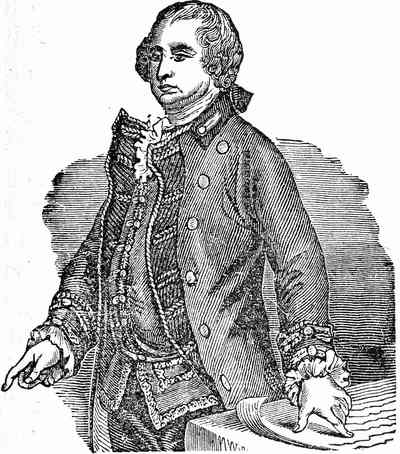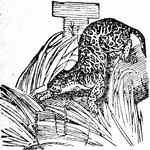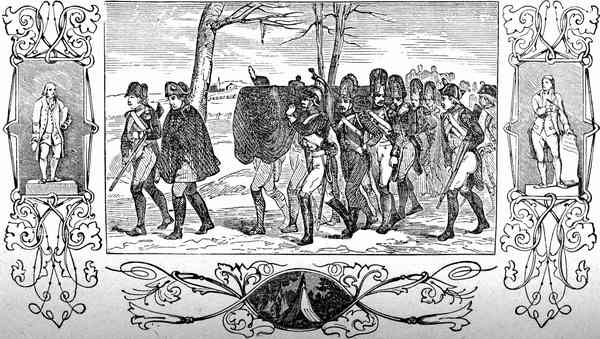Thrilling Incidents In American History
• Preface
Revolutionary War
• Opening Of The Revolution
• The Boston Massacre
• Affair of the Sloop Liberty
• Affair of the Gaspee
• The Tea Riot
• The Boston Port Bill
• The First Continental Congress-Consequent Parliamentary proceedings
• Organization of the Minute-Men
• Patrick Henry-Second Provincial Congress-First Military Enterprise
• Battles of Lexington and Concord
• Battle of Bunker's Hill
• Capture of Ticonderoga
• Second Continental Congress-Washington's Appointment
• Siege of Boston
• Incidents at the Evacuation of Boston
• Burning of Falmouth
• Arnold's Expedition to Quebec
• Siege of Quebec, and Death of Montgomery
• Scenes at Quebec during the Siege
• Expedition against Charleston
• The Declaration of Independence
• The Battle of Long Island
• Washington's Retreat through New Jersey-Capture of General Lee
• Battle of Trenton
• Battle of Princeton
• Capture of General Prescott
• Battle of Brandywine
• Battle of Germantown
• Battle of Red-Bank
• Attack on Fort Mifflin-Retirement of the Army to Valley Forge
• Battle of Bennington
• Murder of Miss M'Crea
• Battle of Stillwater
• Battle of Bemis' Heights, and Retreat of Burgoyne
• Capture of Forts Clinton and Montgomery
• Surrender of Burgoyne
• The Treaty with France
• Attack on Savannah, and Death of Pulaski
• Storming of Stony Point
• General Sullivan's Campaign against the Mohawks
• Tarleton's Quarters
• Battle of Camden, and Death of De Kalb
• Arnold's Treason
• The Loss of the Randolph
• The British Prison-Ships
• Capture of the Serapis
• Putnam's Feat at Horseneck
• Battle of Eutaw Springs
• Wayne's Charge at Green Spring
• Capture of the General Monk
• The Mutinies
• Battle of the Cowpens
• Capture of New London
• Massacre of Wyoming
• Surrender of Cornwallis
War With France
• Capture of L'Insurgente
• The Constellation and Vengeance
War With Tripoli
• Burning of the Philadelphia
• Bombardment of Tripoli
• Loss of the Intrepid
• Expedition of General Eaton
Second War With England
• Battle of Tippecanoe
• Capture of the Guerriere
• Tragical Affair of an Indian Chief
• Battle and Massacre at the River Raisin
• Captain Holmes's Expedition
• Capture of the Caledonia and Detroit
• The Wasp and Frolic
• Gallant Conduct of Lieutenant Allen at the Capture of the Macedonian
• Capture and Destruction of the Java
• Siege of Fort Meigs
• Capture of York, and Death of General Pike
• Defence of Sackett's Harbour
• Defence of Fort Stephenson
• Battle of Lake Erie
• Battle of the Thames
• Gallant Action of Commodore Chauncey under the guns of Kingston Citadel
• The Sacking of Hampton
• Capture of the Peacock
• Massacre at Fort Mimms
• Surrender of Weatherford
• Battle of Niagara
• BattIe of New Orleans
War With Mexico
• Battle of Palo Alto
• Battle of Resaca de la Palma
• Capture of Monterey
• Battle in the Streets of Monterey
• Thrilling Scenes in the Battle of Buena Vista
• Bombardment of Vera Cruz
• Battle of Cerro Gordo
• Battles of Contreras and Churubusco
• Storming of Chapultepec


Sir Guy Carleton.
SCENES AT QUEBEC DURING THE SIEGE.
 UDGE HENRY, who was one of the prisoners taken by the British at Quebec, and
whose opportunities of information appear to have been excellent, gives in his
narrative of the campaign an account of the death of
Montgomery, different from that which is given above
on the authority of Murray, a British writer. Judge Henry's account is addressed
to his children, and the extract
given below commences after his account of
his own capture, which happened on the 31st of December, 1775, when Montgomery
fell.
UDGE HENRY, who was one of the prisoners taken by the British at Quebec, and
whose opportunities of information appear to have been excellent, gives in his
narrative of the campaign an account of the death of
Montgomery, different from that which is given above
on the authority of Murray, a British writer. Judge Henry's account is addressed
to his children, and the extract
given below commences after his account of
his own capture, which happened on the 31st of December, 1775, when Montgomery
fell.
General Montgomery had marched at the precise time stipulated, and had arrived at his destined place of attack, nearly about the time we attacked the first barrier. He was not one that would loiter. Colonel Campbell, of the New York troops, a large, good-looking man, who was second in command of that party, and was deemed a veteran, accompanied the army to the assault; his station was rearward, General Montgomery, with his aids, were at the point of the column.
It is impossible to give you a fair and complete idea of the nature and situation of the place solely with the pen-the pencil is required. As by the special permission of government, obtained by the good offices of Captain Prentis, in the summer following, Boyd, a few others and myself reviewed the causes of our disaster; it is therefore in my power, so far as my abilities will permit, to give you a tolerable notion of the spot. Cape Diamond nearly resembles the greqt jutting rock which is in the narrows at Hunter's Falls, on the Susquehanna. The rock, at the latter place, shoots out as steeply as that at Quebec, but by no means forms so great an angle, on the margin of the river; but is more craggy. There is a stronger and more obvious difference in the comparison. When you surmount the hill at St. Charles, or the St. Lawrence side, which to the eye are equaUy high, and steep, you are on Abraham's Plains, and see an extensive champaign country. The bird's-eye view around Quebec bears a striking conformity to the sites of Northumberland and Pittsburg, in Pennsylvania; but the former is on a more gigantic scale, and each of the latter wants the steepness and cragginess of the back ground, and depth of river. This detail is to instruct you in the geographical situation of Quebec, and for the sole purpose of explaining too manner of General Montgomery's death, and the reasons of our failure. From Wolf's Cove, there is a good beach down to and around "Cape Diamond." The bulwarks of the city came to the edge of the hill, above that place. Thence down the side of the precipice, slantingly to the brink of the river, there was a stockade of strong posts, fifteen or twenty feet high, knit together by a stout railing, at bottom and top with pins. This was no mean defence, and was at the distance of one hundred yards from the point of the rock. Within this palisade, and at a few yards from the very point itself, there was a like palisade, though it did not run so high up the hill.
Again, within Cape Diamond, and probably at a distance of fifty yards, there stood a block-house, which seemed to take up the space between the foot of the hill and the precipitous bank of the river, leaving a cartway or passage on each side of it. When heights and distances are spoken of, you must recollect that the description of Cape Diamond and its vicinity is merely that of the eye, made as it were running, under the inspection of an officer. The review of the ground our army had acted upon, was accorded us as a particular favour. Even to have stepped the spaces in a formal manner would have been dishonourable, if not a species of treason. A block-house, if well constructed, is an admirable method of defence, which in the process of the war, to our cost, was fully experienced. In the instance now before us (though the house was not built upon the most approved principles), it was a formidable object. It was a square of perhaps forty or fifty fect. The large logs, neatly squared, were tightly bound together by dove-tail work. If not much mistaken, the lower story contained loop-holes for musketry, so narrow that those within could not be harmed from without. The upper story had four or more portholes, for cannon of a large calibre. These guns were charged with grape or canister-shot, and were pointed with exactness towards the avenue at Cape Diamond. The hero Montgomery came. The drowsy or drunken guard did not hear the sawing of the posts of the first palisade. Here, if not very erroneous, four posts were sawed and thrown aside so as to admit tour men abreast. The column entered with a manly fortitude. Montgomery, accompanied by his aids, M'Pherson and Cheeseman, advanced in front. Arriving at the second palisade, the genera], with his own hands, sawed down two of the pickets, in such a manner as to admit two men abreast. These sawed pickets were close under the hill, and but a few yards from the very point of the rock, out of the view and fire of the enemy from the blockhouse. Until our troops advanced to the point, no harm could ensue but by stones thrown from above. Even now there had been but an imperfect discovery of the advancing of an enemy, and that only by the intoxicated guard. The guard fled; the general advanced a few paces. A drunken sailor returned to his gun, swearing he would not forsake it while undischarged. This fact is related from the testimony of the guard on the morning of our capture, some of those sailors being our guard. Applying the match, this single discharge deprived us of our excellent commander.
Examining the spot, the officer who escorted us, professing to be one of those who first came to the place after the death of Montgomery, showed the position in which the general's body was found. It lay two paces from the brink of the river, on the back, the arms extended,-Cheeseman lay on the left; and M'Pherson on the right, in a triangular position. Two other brave men lay near them. The ground above described was visited by an inquisitive eye, so that you may rely with some implicitness on the truth of the picture. As all danger from without had vanished, the government had not only permitted the mutilated palisades to remain, without renewing the enclosure, but the very sticks, sawed by the hand of Our commander, still lay strewed about the spot.
Colonel Campbell, appalled by the death of the genera], retreated a little way from Cape Diamond, out of the reach of the cannon of the block-house, and called a council of officers, who, it was said, justified his receding from the attack. By rushing on, as military duty required, and a brave man would have done, the block-house might have been occupied by a small number, and was unassailable from without, but by cannon. From the block-house to the centre of the Lower Town, where we were, there was no obstacle to impede a force so powerful as that under Colonel Campbell.
Cowardice, or a want of good-will towards our cause, left us to our miserable fate. A junction, though we might not conquer the fortress, would enable us to make an honourable retreat, though with the loss of many valuable lives. Campbell, who was ever after considered as a poltroon in grain, retreated, leaving the bodies of the general, M'Pherson and Cheeseman, to be devoured by the dogs.
The disgust caused among us, as to Campbell, was so great as to create the unchristian wish, that be migbt be hanged. In that desultory period, though he was tried, he was acquitted; that was also the case of Colonel Enos, who deserted us on the Kennebec. Tbere never were two men more worthy of punishment of the most exemplary kind.
On the 3d or 4th of January, being as it were domesticated in the sergeant's mess in the reguliers, a file of men, headed by an officer, called to conduct me to the seminary. Adhering to the advice of Colonel M'Dougal, the invitation was declined, though the hero Morgan had solicited this grace from Governor Carleton, and had sent me a kind and pressing message. My reasons, wbich were explained to Morgan, in addition to the one already given, operated forcibly on my mind. Having lost all my clothes in the wilderness, except those on my back; and those acquired by the provident and gratuitous spirit of General Montgomery having remained at our quarters, and become a prey to the women and invalids of the army; nothing remained fitting me to appear in company anywhere. Additionally, it had become a resolution, when leaving Lancaster, as my absence would go near to break the hearts of my parents, never to break upon my worthy father's purse. Dire necessity compelled me to rescind this resolution in part, in the wilderness, but that circumstance made me the more determined to adhere to the resolve afterwards. Again, my intimate friends were not in the seminary. Steele was in the hospital, and Simpson, by previous command, on the charming Isle of Orleans, which, from its fruitfulness, had become as it were our store-house. Add to all these reasons, it could not be said of the gentlemen in the seminary, "they are my intimates," except as to Captain Morgan, and Lieutenant F. Nichols of Hendrick's. Besides, my leather small-clothes, all in fritters, had been cast away, and a savage covering adopted until more auspicious times came. But even now, an idea of escape and vengeance inflamed the breasts of many, and we were here in a much superior situation for such a purpase than that of the seminary. All these facts and circumstances, induced me to decline the friendly solicitation of the kind-hearted Morgan.
On the third day after our capture, the generous Carleton despatched a flag to Arnold, to obtain what trifling baggage we had left at our quarters. Mine was either forgotton, or, miserable as it was, had keen plundered; but as good luck would have it, the knapsack of one Alexander Nelson, of our company, who was killed when running to the first barrier, was disclaimed by all of our men. I, in consequence, laid violent hands upon the spoil. It furnished my companion and myself with a large but coarse blue blanket, called a "stroud," and a drummer's regimental coat. The blanket became a real comfort, the coat an article of barter.
It was on this day that my heart was ready to burst with grief at viewing the funeral of our beloved general. Carleton had, in our former wars with the French, been the friend and fellow-soldier of Montgomery. Though political opinion, perhaps ambition or interest, had thrown these worthies on different sides of the great question, yet the former could not but honour the remains of his quondam friend. About noon the procession passed our quarters. It was most solemn. The coffin, covered with a pall, surmounted by transverse swords, was borne by men. The regular troops, particularly that fine body of men, the seventh regiment, with reversed arms, and scarfs on the left elbow, accompanied the corpse to the grave. The funerals of the other officers, both friends and enemies, were performed this day. From many of us it drew tears of affection for the deceased,-and speaking for myself tears of greeting and thankfulness towards General Carleton. The soldiery and inhabitants appeared affected by the loss of this invaluable man, though he was their enemy. If such men as Washington, Carleton, and Montgomery, had had the entire direction of the adverse war, the contention, in the event, might have happily terminated to the advantage of both sections of the nation. M'Pherson, Cheeseman, Hendricks, and Humphreys, were all dignified by the manner of burial.

Funeral of Montgomery
On the same or the following day, we were compelled (if we would look) to a more disgusting and torturing sight. Many carioles, repeatedly one after the other, passed our dwelling loaded with the dead, whether of the assailants or of the garrison, to a place emphatically called the "dead-house." Here the bodies were heaped in monstrous piles. The horror of the sight, to us southern men, principally consisted in seeing our companions borne to interment, uncoffined, and in the very clothes they had worn in battle,-their limbs distorted in various directions, such as would ensue in the moment of death. Many of our friends and acquaintances were apparent. Poor Nelson lay on the top of half-a-dozen other bodies, his arms extended beyond his head, as if in the act of prayer, and one knee crooked and raised, seemingly, when he last gasped in the agonies of death. A flood of tears was consequent. Though Montgomery was beloved, because of his manliness of soul, heroic bravery, and suavity of manners- Hendricks and Humphreys, for the same admirable qualities, and especially for the endurances we underwent in conjunction, which caused many a tear-still my unhappy and lost brethren, though in humble station, with whom that dreadful wild was penetrated, and from whom came many attentions towards me, forced melancholy sensations.
From what is said relative to the "dead-house," you might conclude that General Carleton was inhumane or hard-hearted. No such thing. In this northern latitude, at this season of the year, according to my feelings (we had no thermometer), the weather was so cold as "usually to be many degrees below zero. A wound, if mortal, or even otherwise, casts the party wounded into the snow; if death should follow, it throws the sufferer into various attitudes, which are assumed in the extreme pain accompanying death. The moment death takes place, the frost fixes the limbs in whatever situation they may then happen to be, and which cannot be reduced to decent order until they are thawed. In this state the bodies of the slain are deposited in the "dead-house," hard as ice. At this season of the year the earth is frozen from two to five feet deep, impenetrable to the best pickaxe, in the hands of the stoutest man. Hence you may perceive a justification of the "dead-house." It is no new observation, that "climates form the manners and habitudes of the people."
